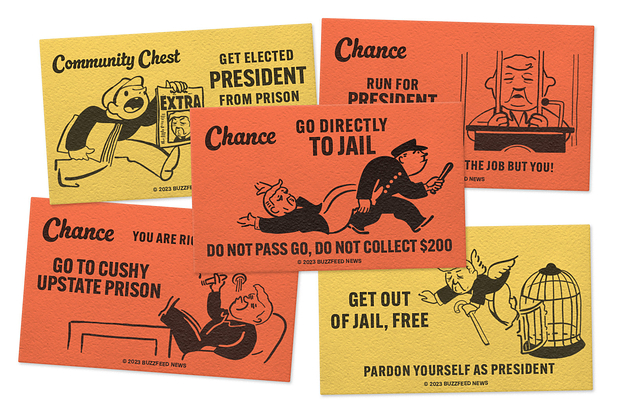OK, but if he did. Would it be, like, a normal prison?
Like many convicted of white-collar crime, Trump would probably go to a minimum-security prison. But don’t start picturing country clubs — minimum security prisons are still very much prisons.
“The biggest difference, I would say, is in the nature of the housing, [which might be] a dorm setting versus a cell setting,” Cardozo Law School professor Alexander Reinert said. “But your freedom is still severely restricted while you’re in the facility.”
But on the other hand, a minimum-security prison might not be safe enough for such a prominent person. Though numerous high-profile people have served prison time before, it’s hard to argue any come close to Trump in terms of reputation (sorry, Martha). There’d be major questions about his security: Would he need to be held in a special unit, separated from the general population? Would the Secret Service come with him?
“It’d be easier to provide that kind of security and safety in a higher-security prison,” Reinert said.
Since this is a state case, Trump would go to a state facility, which would be chosen by the Department of Corrections. As for the so-called Club Fed facilities where you might picture rich and famous convicts doing time, those are solely for federal crimes, as the tongue-in-cheek nickname implies. Since Cohen was convicted on federal charges, he served his prison sentence in FCI Otisville, which Forbes dubbed one of the “cushiest” prisons in the US.
Trump couldn’t run for president from prison, could he??? COULD HE?!?!
Legally speaking, you bet.
“As long as he is over 35, a natural-born citizen of the United States, and a resident for at least 14 years, and has only served as president once, he’s eligible to run for a second term,” Hasen said.
And Trump himself has said that’s the plan. Speaking to reporters at the Conservative Political Action Conference earlier this month, the Hill reported, Trump said he “won’t even think about leaving” the race if indicted, adding that “probably it’ll enhance my numbers.”
If convicted of a felony, he probably wouldn’t be able to vote for himself, though — people who are actively incarcerated are generally ineligible to vote in the US, and only some states allow those convicted of a felony to vote after they’re released.
But could he actually campaign from prison? Well, it’s happened before. In 1920, Socialist Party candidate Eugene V. Debs won 3.4% of the popular vote from a cell in Atlanta Federal Penitentiary, where he was incarcerated on sedition charges for making a speech opposing the World War I draft.
Logistically speaking, it’s harder to say. “He wouldn’t be able to do rallies, there’s lots of people he wouldn’t be able to communicate with, and he wouldn’t be able to meet with fundraisers personally,” Reinert said. “His ability just to communicate with the outside world, even in a minimum security environment, would be significantly restricted — and that’s not even to say about what reputational cost it may have. When I think about all the things the typical presidential candidate has to do, you can do almost none of that if you’re incarcerated.”
There’s also the whole matter of timing. Even if Trump is eventually convicted and sentenced to prison, it would come after a very lengthy trial that has not even begun yet.
“If there is going to be a trial of Donald Trump, I doubt that the trial and all the appeals will be concluded before November 2024,” Eisen said.
Let’s say he won the presidency. Could he then pardon himself?
Not for this case, since these are state charges — presidential pardons can only be granted for federal crimes.
If he were to be convicted on federal charges…no one’s totally sure. Shortly before leaving office, Trump reportedly floated the idea of pardoning himself for potential crimes, the legitimacy of which was the subject of debate by legal scholars. In a 1974 memo, the Department of Justice took the position that a self-pardon would be unconstitutional, but that’s not legally binding.
With no legal precedent for such a move, it’s unclear whether such a pardon would actually hold up. But even if it did, that still wouldn’t be the end of his legal troubles. “If he pardons himself, maybe he would be impeached for doing so and removed from office for abuse of power,” Hasen said.
Trump’s in trouble for a bunch of other stuff too, right?
Right indeed — the New York case is just one of several Trump is facing, though as of early April he has not been charged in any other case.
In Georgia, a grand jury is investigating Trump’s alleged attempt to overturn the 2020 election results. That case is based on a phone call Trump had just days before Biden’s inauguration, during which he threatened and berated Georgia Secretary of State Brad Raffensperger to try and get him to manipulate the state’s election results in his favor. During their chat, Trump begged him to “find” enough votes to help him win. Shortly after the Washington Post published leaked audio of the call, prosecutors in Fulton County, Georgia, opened a criminal investigation into “attempts to influence” the election. In a Truth Social video on March 21, Trump defended the call as “absolutely perfect.”
At the federal level, Trump is also being investigated for his alleged mishandling of classified documents, as well as for his actions related to the Jan. 6 insurrection and alleged attempts to overturn the election.
So no matter what happens with the New York case, Trump is still in some profound legal jeopardy.
“Donald Trump faces the most serious prospect yet — not just of prosecution, but of actual conviction — in his entire half-century-plus career of skirting the edges of the law,” Eisen said. “This may be the time that he finally falls off.”



